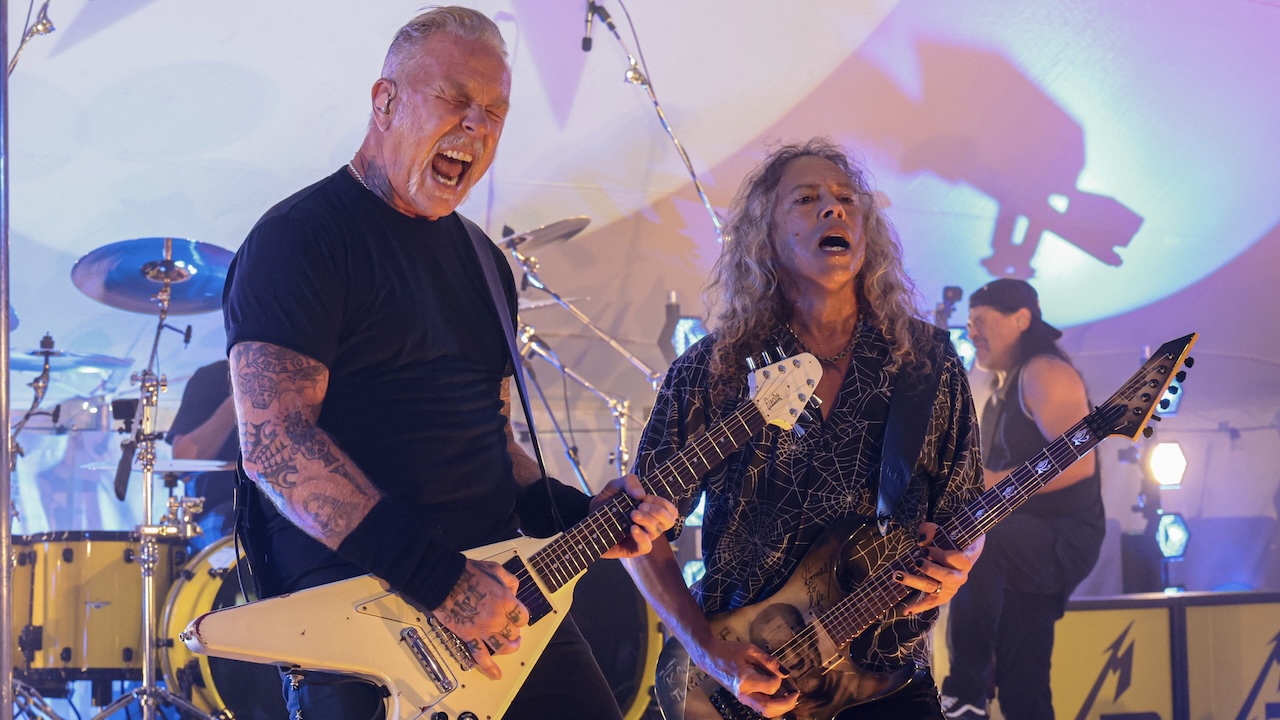Meet Subterranean Masquerade: the Metallica covering, Hebrew-singing heavy metal band from Israel
How Subterranean Masquerade's Mountain Fever helped them embrace their Jewish heritage and find a home in Israel's metal scene after 25 years

Select the newsletters you’d like to receive. Then, add your email to sign up.
You are now subscribed
Your newsletter sign-up was successful
Want to add more newsletters?
When guitarist Tomer Pink formed Subterranean Masquerade in 1997, Israel’s metal scene wasn’t just underground – it was practically non-existent. The emergence of Orphaned Land at the start of the 90s had helped kick-start a trickle of local metal bands, but the country’s offering was few and far between, and the few bands that did exist operated almost entirely in obscurity. Salem, quite possibly Israel’s first metal band overall (having formed in 1985) gained some traction with tape-trading networks (including catching the attention of Mayhem’s Euronymous), but otherwise Israel was a barren plain.
“There was a big underground metal scene in the early 90s but it didn’t last,” Tomer explains. “Lots of the listeners and musicians who were making that music at that time went out to India and got into electronic music… and magic mushrooms! The guys who came back from that experience went very orthodox and – aside from Orphaned Land – there aren’t any bands from those first few years who are still around.”
Tomer had a vision, however. Turned on to rock music by behemoths like Nirvana, Guns N’ Roses and Metallica, Tomer’s passion for all things extreme began when he heard Emperor’s In The Nightside Eclipse. “It totally blew my mind!” he says. “Not long after I heard Cradle of Filth’s The Principle Of Evil Made Flesh. After that I got into a lot more death metal and black metal – Entombed, Carcass; all those Earache Records bands plus stuff like Hecate Enthroned. It absolutely blew my mind to have this black metal with keyboards, singing, screaming, everything!”
Deciding he couldn’t just wait for metal to come to Israel, Tomer set about forming a band of his own, supplementing his income by working for local label MDMA. “MDMA was run by Kobi Farhi, the singer of Orphaned Land,” Tomer says.
“I was just star-struck to be working with him; he was the singer of my favourite Israeli band after all! We started developing the scene slowly from there. Starting out, nobody wanted to stock the albums in record shops. We made a deal with one place called Chaos, which became the only Israeli record store that stocked both European imports and things we were putting out with MDMA.”
Their successes were small, but incremental. In time, Tomer pivoted to also promoting shows in Israel, persuading bands like Rotting Christ to play in the country. The influx of international bands proved to be tinder for the Israeli metal scene’s emerging flame as shows sold out and rooms got bigger. Tomer was even able to persuade bigger artists to put on special, Israel-exclusive shows.
“Our second show was getting a local band to play with Tomas Lindberg of At The Gates, playing songs from Slaughter Of The Soul,” Tomer excitedly says. “Then in 2001, I decided I wanted to do my favourite band, Cradle of Filth, so I booked a show in Tel Aviv right around when they were doing From Cradle To Enslave.”
Sign up below to get the latest from Metal Hammer, plus exclusive special offers, direct to your inbox!
If booking Cradle Of Filth had Tomer excited, the fact his own band would support was the stuff dreams were made of. Unfortunately, it was a dream that would be crushed by the realities of Israel’s complicated political situation. “In 2001 the situation in Israel got very tense,” he explains.
“There was an uprising and a couple of soldiers got lost and ended up in the Palestinian town of Ramallah. They ended up being killed by a mob and it became a big thing on TV and got covered in international media; the day after I got a call from Cradle of Filth’s management to say they were sick and couldn’t make the show. It seemed more likely that the band weren’t willing to come to what looked like an active warzone.”
At just 19, Tomer had spent almost all of his money booking and promoting the show, expecting to recoup it back after the sold-out event. While he could just refund the tickets for fans, the miscellanea of other expenses (venue hire, equipment, vans, security) meant he was suddenly deep in debt. So when he was offered a chance to get out and lay low in the US, he took it. “I basically ran away from everything from my past, be it speaking Hebrew, calling myself Israeli, whatever,” he says. “People had let me down, I’d lost my festival and had to sell everything I had, so I left Israel with nothing.”
Tomer spent four years in the US, living in self-imposed exile and quietly avoiding any ties to his past. But as the years wore on, he found his old passions resurfacing and a yearning to return to Israel and his roots. By 2004 he was almost ready to return to his old life and had even resurrected Subterranean Masquerade to record their debut album, Suspended Animation Dreams. Released in 2005, the band's first album remains remarkably ambitious, their brand of progressive extreme metal as indebted to Opeth and gothic metal as it was to prog and Avante-Garde, taking on elements of jazz and folk for a stunningly diverse sound.
“I don’t really like that album much these days,” Tomer admits. “It’s a big part of my history, but I wasn’t a good guitarist on that album and had more ideas than what we could really achieve at that point.”
Though Tomer had moved back home to Israel by 2005, he soon found that the word ‘home’ no longer meant what it once had. “I didn’t feel any connection to the country at all,” he explains. Packing his bags again, he decided to embark on the same journey his forebears in Israeli metal had almost a decade earlier and travel across India.
“There, I discovered a beautiful country with beautiful music, people and folklore – it made me realise what I truly needed was wide open spaces and to travel. I went trekking through the Himalayas, trekking through the North of India and the sense of freedom blew my mind. Before I left all I listened to was metal – it took five years in the States before I started expanding my tastes, when I discovered Ziggy Stardust. It took me a while to get there.”

In fact, it wasn’t until 2018 that the final pieces of the Subterranean Masquerade puzzle fell into place with the inclusion of vocalist Davidavi ‘Vidi’ Dolev and drummer Yalon Schori. With their arrival, the band had its most stable – and active – line-up since it had formed almost 20 years previous. In Vidi, Tomer hadn’t just found a new vocalist – he also found a kindred spirit, another musician who had travelled both physically and sonically to find his path. Vidi too had struggled with a feeling of displacement and had even relocated to Scandinavia for a time in order to expand his horizons.
This all ultimately fed into the writing for the band's fourth studio album Mountain Fever, an album which was written to reflect the totality of the band’s experiences, dealing heavily with themes of identity and displacement that both Vidi and Tomer had experienced, but also with experiences they felt were inherent to all Jewish people worldwide.
“I know this isn’t a topic people like to talk about, but there is a huge sense of generational trauma, particularly for my grandparents,” Vidi says. “They had to flee their homes and when they finally arrived in Israel, they had basically adjusted to the mechanic of always being ready to gather their things and go. When my grandmother got Alzheimer’s she began to sleep with her shoes on as she thought someone was going to force her from her home. A lot of the songs on the new album were based on my relationship with her.”
As proud as both Vidi and Tomer are of their heritage, they acknowledge their sense of wanderlust is never too far away. “Every once in a while I get the urge to grab a guitar, pack a bag and just go away,” Tomer admits. “India is still my favourite place to do that; I made a deal with my family so that every two years I can go off to a mountain in the Himalayas to write, relax and do some cooking lessons. The song Vagabond on this new album was written in the Himalayas, the lyrics were about my experiences in that moment, about being so far from family and friends yet somehow finding a feeling like home somewhere that really isn’t home, but feels closer to it than anywhere else.”
“Most people who live in Israel are sons and daughters of immigrants, so there’s this sense of longing that in Hebrew is called Kissufim (כיסופים),” Vidi adds. “The idea is that even if you are exactly where you’re supposed to be, that you have everything you could ever want, you’ll still feel pain because your soul will wish to be part of something much bigger because you are part of something much bigger. So on Mountain Fever I took this spiritual idea and felt like it was something we needed to express and explore.”
In turn, this informed the direction of the album, both embrace their Israeli and Jewish heritage whilst looking to the wider world for inspiration. The album cycle for Mountain Fever has featured two covers which perhaps perfectly capture this; the traditional Jewish song Ya Shema Evyonecha (sung in Hebrew), and Metallica’s Wherever I May Roam. Though the songs couldn’t be further apart culturally, lyrically the band see many similarities.
“It all starts from the lyrics,” Vidi says. “Wherever I May Roam is all about a nomadic lifestyle and most of Subterranean Masquerade’s lyrics are also about that; about where you came from and where you’re going to. We’d wanted to do it for a while, but we never really had time in our schedule to work it all out. After Mountain Fever was released we had time to breathe, so instead of just resting we figured we could do something to commemorate the 30th anniversary of the Black Album. We figured we could take the basic concept of the song and see how we could make that our own.”
But how exactly does that fit in with a traditional Jewish prayer?
“We have a holiday called Yom Kippur where you’re supposed to think about what you have done over the past twelve months and re-evaluate who you are,” Tomer says. “For me it’s fascinating, there’s a really heavy energy about it. We wrote the song Kippur on Vagabond about the holiday in the past, but I’ve always liked the prayer Ya Shema Evyonecha. It’s the first song we’ve done in Hebrew which took some nuts as people don’t really sing in Hebrew here.”
“The song is almost 1000 years old,” Vidi adds. “I’m fascinated by the person who wrote it, this guy in Spain, Rabbi Yehuda Halevi, who was a poet and philosopher and one of his poems was effectively about how even though his body was in the West, his heart was in the East. It was instantly perfect. He knew what it meant to be in exile even though he’d never lived anywhere else; he lived in Spain most his life but eventually died in Crusader-era Jerusalem. It’s exactly the kind of thing we’ve been singing about with Mountain Fever – this album talks about exile and identity as much as it does about love and guilt, these concepts that basically bind somebody to other people, places or ideas.”
In October 2021, Subterranean Masquerade played for the first time in over 18 months when they appeared at Israeli Metal Fest, an event set up to bring both local and international acts together. Standing amidst a sea of cheering faces, it was a moment of triumph after everything they had been through and physical evidence that the scene had grown over the past 25 years.
But for a moment, there worries that history might just be repeating, as just weeks before the show organisers were forced to move the event and worries arose that it might be cancelled completely. “We’d originally planned for the show to be in the Sea of Galilee but one week before the police told the organisers that they wanted a few hundred thousand shekels more for ‘security reasons’,” Vidi says darkly.
“With such short notice there was no way it could be done, so the show got moved to Tel Aviv, which is where most metal shows happen anyway. People were disappointed because they were looking forward to the camping aspects of the festival, which is something we generally don’t have here, but nobody was angry when they got to the actual show.”
After all Israel, like the rest of the world, had been starved of live music for 18 months of uncertainty where it looked like normality might never return. The fact an event like Israeli Metal Fest could even go ahead was a victory, made all the sweeter by the range of local talent that filled the bill. “Israel is a small country and the scene is pretty small too, so any time we get bands come from overseas it’s very special,” Vidi explains. “But it also means people don’t always support homegrown bands – you’re just seen as naturally smaller acts.”
“But this year something really changed – maybe it’s COVID and bands not being able to come from overseas or whatever, but it meant we’re seeing hundreds more people at Israeli metal shows now. It feels like we’re developing a new relationship with Israeli audiences we’ve never had before. It’s funny; we’ve always been bigger in places like France, because at home nobody ever really paid attention. It showed the people of Israel that there’s a strong scene here and we need to nurture it.”
For Tomer, who has been doing this since he was a teenager and seen the scene at both boom and bust points, the event was vindication for everything he had ever worked towards. But that begs the question – if Orphaned Land are the Black Sabbath of Israeli metal, the first band to break beyond borders and lend shape to Israel’s heavy metal scene, does that make Subterranean Masquerade Israel’s answer to Judas Priest? “I don’t know,” he says, honestly. “We’re only just starting to truly write the history of Subterranean Masquerade though, so maybe ask us again in another 25 years!”
Mountain Fever is out now via Sensory Records/The Laser's Edge

News editor for Metal Hammer, Rich has never met a feature he didn't fancy, which is just as well when it comes to covering everything rock, punk and metal for both print and online. He's as happy digging up new bands from around the world and covering scenes in countries like Morocco and Estonia as he is covering world-conquering acts like Sleep Token, Black Sabbath and Deftones.

